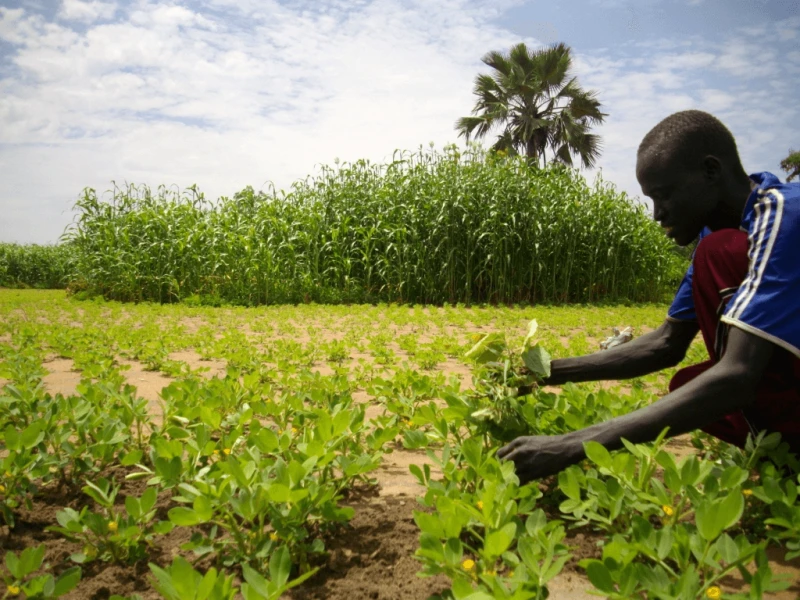Flipping the script: Gates Foundation funds ‘farmer-centric’ approach to developing next-generation agricultural technologies in the developing world
Flipping the script: Gates Foundation funds ‘farmer-centric’ approach to developing next-generation agricultural technologies in the developing world


Across the world, agricultural scientists are starting to work backward.
For years, they’ve seen how improved crop varieties — which take decades to produce in a lab — are rejected by the farmers who need them most. They might be pest-resistant, but take too long to cook. Drought-tolerant, but require expensive fertilizers. And high-yield, but with leaves that are too small to eat.
But now, many are shifting the way they design hybrid crops by involving farmers at the very start of the process instead of years after a solution has already been created by scientists in a lab.
Despite taking up just 12% of the world’s agricultural land, small-scale farmers produce over a third of the global food supply, according to the United Nations Food and Agriculture Organization. At the same time, these farmers — some 600 million globally — are particularly vulnerable to severe weather events. They’re also less likely to have fertilizers, equipment, and irrigation mechanisms to counter climate shocks.
But increasingly, the need to support these farmers is being recognized. Late last year, the Bill & Melinda Gates Foundation announced a $1.4 billion investment to help small-scale farmers adapt to climate change, funding that would double the foundation’s already-substantial investment in CGIAR’s agricultural programs.
This is an excerpt. Read the original post here

 | Videos | More... |

Video: Nuclear energy will destroy us? Global warming is an existential threat? Chemicals are massacring bees? Donate to the Green Industrial Complex!
 | Bees & Pollinators | More... |

GLP podcast: Science journalism is a mess. Here’s how to fix it

Mosquito massacre: Can we safely tackle malaria with a CRISPR gene drive?

Are we facing an ‘Insect Apocalypse’ caused by ‘intensive, industrial’ farming and agricultural chemicals? The media say yes; Science says ‘no’
 | Infographics | More... |

Infographic: Global regulatory and health research agencies on whether glyphosate causes cancer
 | GMO FAQs | More... |

Why is there controversy over GMO foods but not GMO drugs?

How are GMOs labeled around the world?

How does genetic engineering differ from conventional breeding?
 | GLP Profiles | More... |

Alex Jones: Right-wing conspiracy theorist stokes fear of GMOs, pesticides to sell ‘health supplements’




 Viewpoint — Fact checking MAHA mythmakers: How wellness influencers and RFK, Jr. undermine American science and health
Viewpoint — Fact checking MAHA mythmakers: How wellness influencers and RFK, Jr. undermine American science and health Viewpoint: Video — Big Solar is gobbling up productive agricultural land and hurting farmers yet providing little energy or sustainabilty gains
Viewpoint: Video — Big Solar is gobbling up productive agricultural land and hurting farmers yet providing little energy or sustainabilty gains Fighting deforestation with CO2: Biotechnology breakthrough creates sustainable palm oil alternative for cosmetics
Fighting deforestation with CO2: Biotechnology breakthrough creates sustainable palm oil alternative for cosmetics Trust issues: What happens when therapists use ChatGPT?
Trust issues: What happens when therapists use ChatGPT? California, Washington, Oregon forge immunization alliance to safeguard vaccine access against federal undermining
California, Washington, Oregon forge immunization alliance to safeguard vaccine access against federal undermining 30-year-old tomato line shows genetic resistance to devastating virus
30-year-old tomato line shows genetic resistance to devastating virus The free-range chicken dilemma: Better for birds, but with substantial costs
The free-range chicken dilemma: Better for birds, but with substantial costs ‘You have to treat the brain first’: Rethinking chronic pain with Sanjay Gupta
‘You have to treat the brain first’: Rethinking chronic pain with Sanjay Gupta
